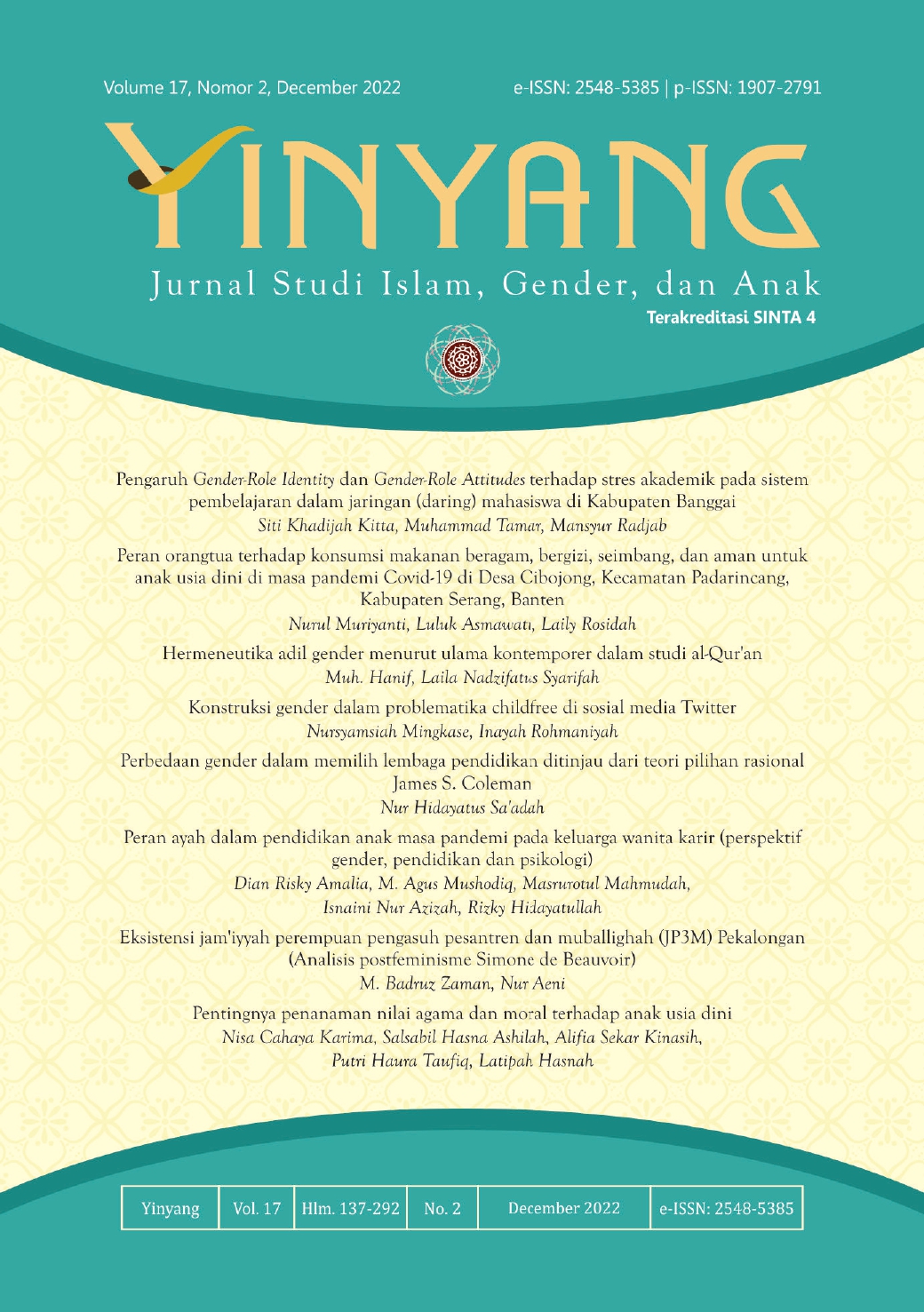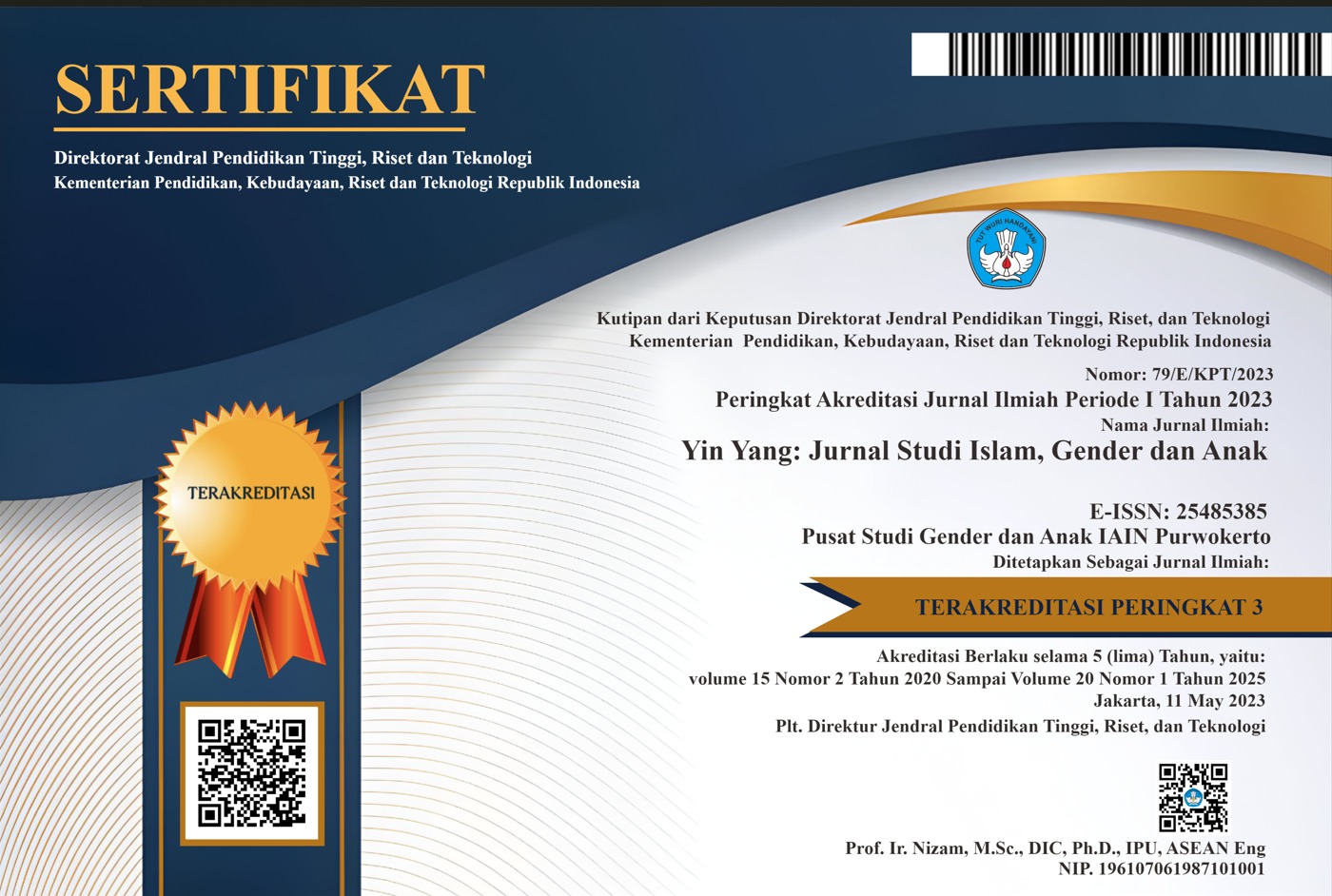Pengaruh Gender-Role Identity dan Gender-Role Attitudes terhadap stres akademik pada sistem pembelajaran dalam jaringan (daring) mahasiswa di Kabupaten Banggai
DOI:
https://doi.org/10.24090/yinyang.v17i2.6880Keywords:
Academic Stress, Gender-role attitudes, Gender-role Identitiy, WomenAbstract
This study aims to look the effect of gender-role identity and gender-role attitudes on academic stress on the online learning system of students at universities in Banggai Regency. Respondents of this study amounted to 326 respondents. The sampling technique used is simple random sampling. The data collected were analyzed using multiple linear regression to see the effect of the independent variables gender-role identity and gender-role attitudes on the dependent variable academic stress. The results of the study found that gender-role identity, the feminine category, had a significant effect on academic stress with a positive relationship direction, while gender-role attitudes had a significant effect on the direction of a negative relationship direction with academic stress. This means that the higher the feminine quality possessed by the individual, the higher the level of academic stress he has. As for attitudes toward gender roles, the more transcendent an individual's gender role attitude is, the lower the level of academic stress will be. On the other hand, the sexism of the gender role attitude of the individual, the higher the level of academic stres. The contribution of gender-role identity and gender-role attitudes simultaneously to academic stress is 6.9%.Downloads
References
Bedewy, D. & Adel Gabriel. (2015). Examining perceptions of academic stress and its sources among university students: The Perception of Academic Stress Scale. Health Psychology Open.
Berta, R., Dias., Paulo C. (2020). Anxiety, depression and stres in university students: the impact of COVID-19. Estud. psicol. (Campinas) [online]. 37.
Bem, S.L. (1974). The Measurement of Psychological Androgyny. J Consult Clin Psycho, 42: 155-162.
Bem, S.L. (1981). A Manual for The Bem Sex Role Inventory. Palo Alto: Consulting Psychologist Press.
Brand H and Schoonheim-Klein M (2009) Is the OSCE more stressful? Examination anxiety and its consequences in different assessment methods in dental education. European Journal of Dental Education 13: 147–153.
Calaguas, G.M. (2011). Collage Academic Stress: Differences Along Gender Lines. Journal of Social and Development Sciences, 1 (5): 194-201.
Chapell M, Blanding Z, Silverstein M, et al. (2005) Test anxiety and academic performance in undergraduate and graduate students. Journal of Educational Psychology 97: 268–274.
Connell, J. P., & Wellborn, J. G. (1991). Competence, autonomy, and relatedness: a motivational analysis of self-system processes. In M. R. Gunnar, & L. A. Sroufe (Eds.). Self processes in development: Minnesota symposium on child psychology, 23: 43-77. Chicago: University of Chicago Press.
Cueto, E.G., Fransisco , J.R.D., Carolina B.M, Jevier L.C.B, Susana P.Q., & Luis R.F. (2014). Development of the Gender Role Attitudes Scale (GRAS) amongst young Spanish people. International Journal of Clinical and Health Psychology.
Dhawan, S. (2020). Online Learning: A Panacea in the Time of COVID-19 Crisis. Journal of Education Technology System.
Eagly, A.H., & Chaiken, S. (1998). Attitude Structure and Function. The Handbook of Social Psychology, 4 (1). USA: McGraw-Hill.
Eccles, J.S. (1987). Gender Roles and Women’s Achievement-Related Decision. Psychology of Women Quarterly, 11 (2): 135-172.
Ehrtmann, L. & Wolter, I. (2018). The Impact of Students’ Gender-ole Orientation on Competence Development in Mathematics and Reading in Secondary School. Learning and Individual Differences, 61: 256-264.
Finn, J. (1989). “Withdrawing from School.” Review of Educational Research 59 (2): 117–142.
Finn, J. D., & Rock, D. A. (1997). Academic success among students at risk for school failure. Journal of Applied Psychology, 82: 221-234.
Frier, B.W., & Thomas A. J. M. (2004). A Casebook on Roman Family Law. Oxfor University Press.
Gaunt, R., & Benjamin, O. (2007). Job Insecurity, Stress and Gender. Community, Work & Family 10 (3): 341-355.
Hasanah, U., Ludiana, Immawati, & Livana. (2020). Gambaran Psikologis Mahasiswa Dalam Proses Pembelajaran Selama Pandemi COVID-19. Jurnal Maia Keperawatan Jiwa, 8 (3): 299-306.
Helgeson, V.S. (2012). The Psychology of Gender: Fourth Ed. USA: Pearson Education, Inc.
Heyder, A.,& Kessels, U. (2013). Is School Feminine? Implicit Gender Stereotyping of School As A Predictor of Academic Achievement. Sex Roles, 69(11-12): 605-617.
Jones, K., Sarah. M., & Charlsie, A.M. (2016). The effects of sex and gender role identity on perceived stress and coping among traditional and nontraditional students. Journal of American Collage Health, 64 (3): 205-213.
Kaplan, A., & Bean, J. (1976). From Sex Stereotypes to Androgyny: Considerations of Societal and Individual Change.
Khusniyah, N.L., & Hakim, L. (2019). Efektifitas Pembelajaran Berbasis Daring: Sebuah Bukti Pada Pembelajaran Bahasa Inggris. Jurnal Tatsqif: Jurnal Pendidikan dan Penelitian Pendidikan, 17 (1).
Lederman, D (2020). Responding to The COVID-19 Crisis: A Survey of Collage and University Presidents. A Study by Inside Higher Ed and Hanover Research.
Livana, P. H., Mubin, M. F., & Basthomi, Y. (2020). " Learning Task" Attributable to Students' Stres During the Pandemic Covid-19. Jurnal Ilmu Keperawatan Jiwa, 3(2): 203-208.
Mantiri, J. (2019). Peran Pendidikan dalam Menciptakan Sumber Daya Manusia Berkualitas di Provinsi Sulawesi Utara. Jurnal Civic Education, 3 (1).
Maulana, H.A, & Rosada, D.I. (2020). Analisis Tingkat Stres Mahasiswa Terhadap Pembelajaran Daring pada Mata Kuliah Statistik Bisnis di Pendidikan Vokasi. Jurnal Ilmiah Kependidikan, 14 (1).
Misra, R., & Castillo, L.G. (2004). Academic stress among college students: comparison ofamerican and international students. International Journal of Stress Management, 11 (2):132-148.
Musabiq, S. & Isqi K. (2018). Gambaran Stres dan Dampaknya pada Mahasiswa. Insight Jurnal Ilmiah Psikologi, 20 (2).
Neuderth S, Jabs B and Schmidtke A (2009) Strategies for reducing test anxiety and optimizing exam preparation in German university students: A prevention-oriented pilot project of the University of Würzburg. Journal of Neural Transmission 116: 785–790.
Oman, D., Shapiro, S.L., Thoresen, C.E., & Plante, T.G. (2008). Meditation lowers stress ands upports forgiveness among college students: a randomized controlled trial. Journal ofAmerican College Health, 56 (5): 569- 578.
Reisch, D.B., & Mary, E. (1992). Gender Orientation and The Bem Sex Role Inventory: A Psychological Construct Revisited. Sex Roles, 26(5-6): 291-306.
Rosa, S.D.L. (2020). Ed experts fear rise in dropouts as remote learning continues. Education Dive.
Safitri, H. (2016). Pengembangan Sumber Daya Manusia dalam Pembangunan. Jurnal of Islamic Education Management, 1 (1). Manajemen Pendidikan Islam
Salama, N. (2013). Seksisme dalam Sains. SAWWA, 8 (2). IAIN Walisongo Semarang
Schmitz, S. (2010). Sex, Gender, and The Brain – Biological Determinism Versus Socio-Cultural Constructivism. German: University of Goettingen
Tantri, N. R. (2018). Kehadiran Sosial dalam Pembelajaran Daring Berdasarkan Sudut Pandang Pembelajar Pendidikan Terbuka dan Jarak Jauh. Jurnal Pendidikan Terbuka dan Jarak Jauh, 19 (1), 19-30.
Voelkl, K. E. (1996). “Measuring Students’ Identification with School.” Educational and Psychological Measurement 56 (5).
Whitley, B.E. (1984). Sex-Role and Psychological Well-Being: Two Meta-Analysis. Journal of Sex Roles, 12: 207-221.
Woodhil, B.M. & Samuels C.A. (2003). Positive and Negative Androgyny and Their Relationship with Psychological Health and Wellness. Sex Role, 48: 555-565.
Downloads
Published
How to Cite
Issue
Section
License
Copyright (c) 2022 Siti Khadijah Kitta, Muhammad Tamar, Mansyur Radjab

This work is licensed under a Creative Commons Attribution-ShareAlike 4.0 International License.
Authors who publish with this journal agree to the following terms: Authors retain copyright and grant the journal right of first publication with the work simultaneously licensed under a Creative Commons Attribution-ShareAlike 4.0 International License that allows others to share the work with an acknowledgment of the work's authorship and initial publication in this journal.

















